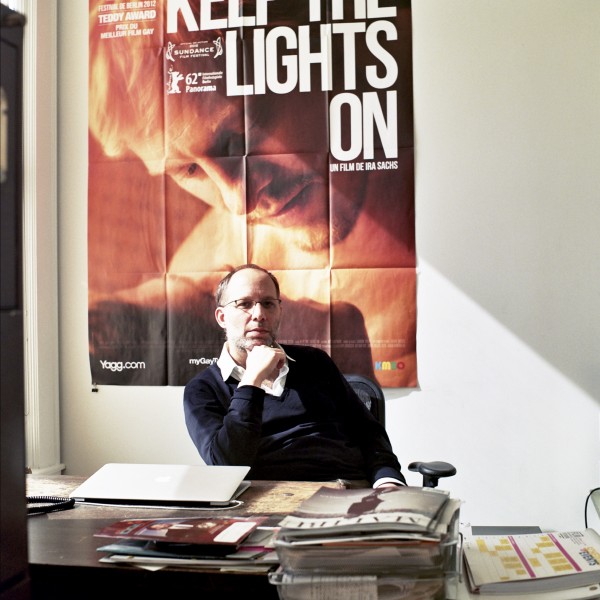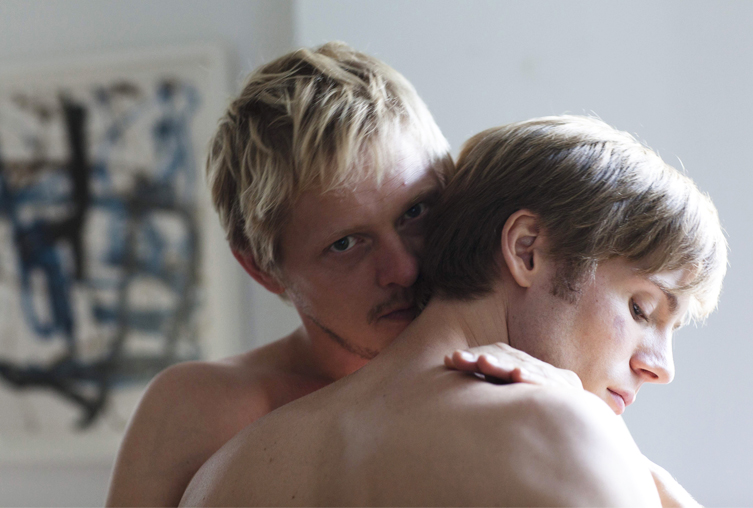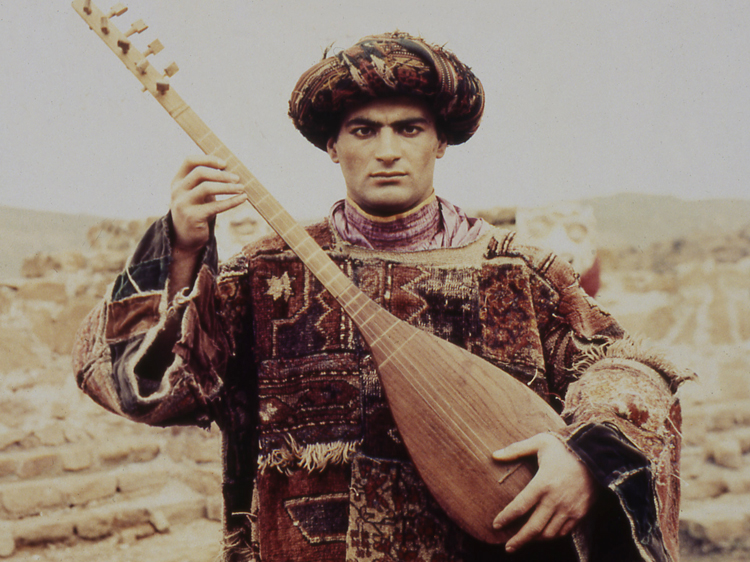
PHOTOGRAPHY BY DANIEL MOSS
IRA SACHS
We visited the director at his office in Soho for a chat about film, the closet and Hollywood.
Where did you grow up? I was born in 1965 in Memphis, Tennessee
When did you come out? I came out at 16, my senior year of high school in 1982. But I think coming out is a long process, and partially what Keep the Lights On is about is the fact that, coming from my generation, it took me decades to actually get to the point where I was honest with who I am with other people—so the closet, you step out of it, and then in other ways you step right back in— it’s an ongoing process…
What was your favorite film of last year, besides yours, Keep The Lights on? My favorite… I was extremely moved by How to Survive a Plague, the documentary about Act Up which I was involved in.
It should’ve won the Oscars for best documentary… Well you know I liked Searching For Sugarman also, but I really loved the film; I loved Julia Loktev’s film The Loneliest Planet with Gael Garcia Bernal, wonderfully made and just emotionally very rich.
What was your favorite film as a kid? Kid is a complicated word, at what age? That’s a good question. I mean I had films that changed my life like Imitation of Life by Douglas Sirk, Nashville by Robert Altman and Shadows by John Cassavetes. These were films that transformed me.
In what way? There was a before and there was an after, somehow seeing those films gave me insight both personally but also as an artist about what was possible with film.
Keep The Lights On, your most recent film, is a very honest telling of your past relationship with Bill Clegg, was it hard to write, or freeing? You know by the time I wrote the script I had gone through all the therapy and sort of confessions that made it — I had already come to terms with the story, I had a certain distance, I think personally I was no longer emotionally in the middle of that story, which was necessary for me to have the vantage point to construct it as a film. So it wasn’t difficult, it’s been extremely liberating to make a film that’s as upfront as this film is because I feel like there’s very little left to hide.
Who financed your last film? Keep The Lights On was financed by the collective community of which I am a part of. Over 400 people got involved to make this film possible. The last few years I’ve been very involved as a community organizer with Queer|Art|Film and also organizing film directors, as an activist, what I did was I turned to that group and I said I need your help, and the group came forward. There were one or two particular angels who flew in and made it possible.
 Thure Lindhardt and Zachary Booth in Keep The Lights On. Photographed by Jean-Christophe Husson.
Thure Lindhardt and Zachary Booth in Keep The Lights On. Photographed by Jean-Christophe Husson.
Is there a name for that organization? I run a monthly evening, it’s a New York film director’s group in Brooklyn and people can get in touch with me if they want to participate, it’s just a social gathering of people involved in cinema.
You run a monthly film series Queer|Art|Film, How do you decide who to involve? I co-curate the series with Adam Baran, who’s a filmmaker, we both just try to keep our ears to the ground in terms of who is creating work that’s interesting to us, we are also very interested in having a wide variety of disciplines and generations, so we’ve had 20-year-old filmmakers, and we’ve had 80-year-old filmmakers, and artists and painters and poets and novelists and musicians. I think that there is a lack of opportunity for queer artists to gather, and we hope to replicate the old, long gone bar Cedar Tavern (where Pollack and Frank O’Hara and De Kooning hung out in the 50’s) or The Algonquin. The possibilities for people to get together and share their experiences, this is something that for myself I had so little opportunity to do when I first moved to NY in the decades that I started making work. I came here at a point in which the generation ahead of me was designated by the AIDS epidemic and so there was a kind of absence of generational conversation and the Queer series is trying to provide an opportunity for that in the city now.
Why is it important that people see these movies? The movies themselves are less important than the conversations that they elicit, I would say this isn’t like a canon of queer cinema many of the films that we show are not explicitly gay, but they have meant something to the presenter creatively. Usually the films are an access point for a discussion of our lives as artists, as New yorkers, as gay people, as men, as women, as trans people. Somehow the films instigate dialog and I think it’s also really important to see a range of films that remind us that we are not doing anything new and that we can try to be braver with the work that we create. For me, in making Keep the Lights On, three years of watching this range of films, and queer art films, was extremely inspiring because I could see Salo by Pasolini, or Jean Cocteau’s early work, or queer cinema from the 90’s, and I realized I can be as brave as these artists were.
It’s a very exciting series… I like how it is not so obviously queer, in the usual use of the term. Queerness doesn’t need to be a limit, it doesn’t need to be a boundary it can actually be an openness to new forms and new sexualities and new possibilities.
How has the representation of queer people in cinema evolved in your lifetime? Is interesting because people talk about with Keep The Lights On and Weekend that there’s this kind of renaissance in queer cinema which I hope it’s true but I don’t necessarily feel it, it’s as hard as ever to get money to make these movies. I also think that if you take a historical perspective, we should actually be challenged by the kind boldness of queer cinema from the 60’s or the 30’s, we can’t be safe, none of us have anything on Fassbinder for example.
A lot of the comments that we heard about Keep The Lights On were that it showcased New York in a very authentic way, it felt very familiar and real to those who live here. Was that intentional? I lived here 25 years before I felt ready to make a movie about New York, for two decades I was too wrapped up in my own life to be able to see it. With KTLO I was finally able to be a historian about what life looked like in New York in the years that I have been here, and people have responded to that reportage in some ways. I think also in a way gay men are open about their sex lives on a certain level but there is also a great tendency to minimize how much we say about what we do. We have learned how to create ellipses that we don’t speak to—what happens between the job and when we get home, and I think there is something liberating about a film that speaks to all the things that a lot of people try to avoid speaking about.
How do you get actors to trust you as a director? I think a combination of the material, some awareness of my previous work and then my personality.
Are there any actors or actresses that you would like to work with? Yeah…sure, I would like to work with the four actors I am about to work with. I am making a film with Alfred Molina, Michael Gambon, Kelly Reilly, Tracy Lentz. Because they are in my mind I am very curious about the experience—what we are going to make.
So, this film still in the works? I haven’t shot it, I’ve written it, am going to shoot it this summer, it’s called Love is a strange.
Is it a queer film? It is.
I can’t wait to hear more about it…
What’s your relationship to Hollywood? Have you been embraced by the mainstream film world? I just came back from the Independent Spirit Awards where Keep The Lights On was nominated for four awards, which was a nice pat on the back from the West coast (in terms of the encouragement to tell stories different than what they are making.) I’ve found that I am stronger by embracing my subculture, and that I am particularly able to tell stories that are not the ones that Hollywood is telling, I am embolden to do so by the response that I received. I think people appreciate the fact that it’s unique.
Do you have any advice for anyone who wants to become a filmmaker? My advice would be to recognize what an artist has to offer—it’s usually their experience and their history and often young filmmakers shy away from what they know because they feel like it’s too obvious, but it’s actually the thing that they have that is more valuable.
 A still from the film Ashik Kerib.
A still from the film Ashik Kerib.
The next Queer|Art|Film is Monday March 18, at 9pm at IFC Center. My Barbarian will present Ashik Kerib. Click here for tickets
The next Queer|Art|Brooklyn meeting is Wednesday, April 24, 8pm, at The West Cafe, 379 Union Ave. Brooklyn, NY.